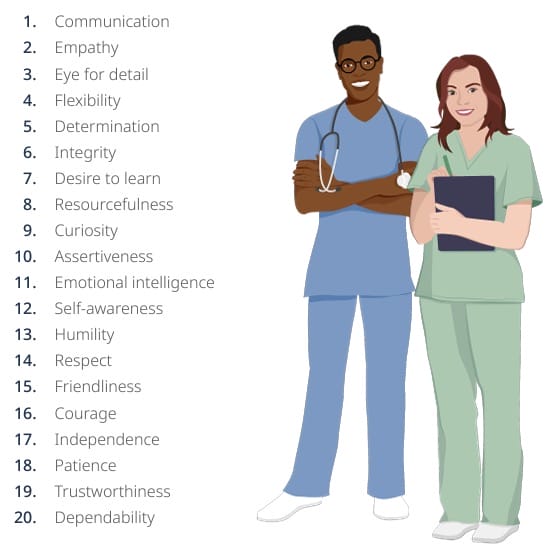Why are there some nurses who make the role seem effortless and provide patient care that is admired by all?

FREE Download: 20 qualities of a good nurse at a glance!
Let’s talk about the qualities of a good nurse and what really makes a good nurse so good.
What Does It Take To Be a Nurse?
There are a lot of stereotypes about what it takes to be a nurse and what kind of personalities nurses have. Though there may be some truth to some of it, many of the stereotypes are exaggerated. In fact, there really aren’t any specific qualities or personality traits that you have to have to be a nurse.
However, there are commonalities among exceptional nurses in terms of character traits and the well-honed skills they possess.
What Skills Do You Need To Be a Nurse?
Starting with the skills you need to provide outstanding nursing care, below are the skills that set good nurses above the pack.
Advocacy
The primary duty of the nurse is to be an advocate for those they care for. It is the nurse’s job to ensure the patient gets the care they need from every member of the team. Nurses also have to advocate for their patients despite conflicting familial views. Advocacy is a skill that a nurse must have to provide truly excellent patient care.
Clinical reasoning
Clinical reasoning is the ability to collect information, perform an assessment, and evaluate the various components to develop a plan of care that supports the patient’s best interests.
Essentially, with clinical reasoning, you are able to look at the patient as a whole with their various characteristics and know what needs to be done based on your findings. Clinical reasoning is an important skill for nurses to meet the needs of the whole person versus only the disease or symptom management.
Critical thinking
Critical thinking is similar to clinical reasoning and just as essential a skill, but it is a bit more complicated. Critical thinking involves analyzing the data and coming up with every possible solution, not just a set conclusion like with clinical reasoning. Nurses need strong critical thinking skills to present the best options to their patients in various situations.
Intuition/instinct
Intuition, or having highly-developed instincts, is a skill that isn’t necessarily required to be a nurse because there are protocols, processes, and resources to do the job without it. However, the best of the best nurses have honed their intuition, which is how these nurses are able to pinpoint issues without concrete evidence.
Keep in mind that intuition comes with experience and practice, so new nurses or nursing students shouldn’t expect to immediately have it. When you do begin to have the instincts, trust them and follow through in order to develop the skill.
Time management
Nurses have to do a lot in very little time, which is why time management is probably the most valuable skill a nurse can have. With time management skills, you can control how much time you spend on each task, which tasks need to come first, and the most efficient order in which to do them.
Listening
Active listening is the final skill that nurses need for exceptional nursing practice. Being able to listen to the needs of your patient, the thoughts of your care team, and the beliefs of the patient’s family is the only way to properly manage patient care as a nurse.
20 Qualities of a Good Nurse
There aren’t many qualities a good nurse has to definitively possess, but there are 20 qualities that top nurses all have in common.
1. Communicative
Nurses must communicate with their patients and their families, care teams, administration, outside providers, and more. Slips in communication cause subpar patient care, disruptive workflows, and excess stress.
2. Empathetic
Empathy is the act of being able to share, respect, and understand the feelings of others even if they are different from yours. Good nurses are empathetic to ensure the patient feels understood during a difficult time.
3. Detail-oriented
In patient care, the details matter and can make a difference. Nurses who are detail-oriented are excellent in their roles.
4. Flexible
Between the tough schedule, unexpected events in every shift, and demands from different directions, nurses have to be flexible. Ridgidity in nursing or not being able to roll with the punches is a recipe for disaster.
5. Determined/persevering
Unfortunately, in patient care, not everything works out the first time. It often takes multiple changes in treatment plans and various approaches to any situation to resolve obstacles. This is why nurses must be determined and persevering.
6. Has integrity
Integrity is the quality of being honest and ethical. As nurses, several people put trust in us during sensitive and tough situations that they expect us to handle with integrity.
7. Desires to learn
There is always new evidence to improve nursing practices and new solutions to obstacles in patient care. Nurses never know everything, which is why they must have an innate desire to continue learning to be the best they can be.
8. Resourceful
In every situation as a nurse, you may not have the exact supplies you need or the ideal environment, but it is still the role of the job to create a positive outcome. A resourceful nurse is an excellent nurse.
9. Curious
A good nurse should always be curious, as curiosity brings about new discoveries — whether that is a change in a patient’s condition or learning about a patient’s culture that can be addressed in their care.
10. Assertive
There can be a lot of egos on a healthcare team. Nurses must have an assertive side that they can use to advocate for their patients when concerns are not being heard.
11. Emotionally intelligent
Nurses often care for people during difficult times in their lives, and that comes with a lot of emotions to handle. Everyone in the situation will have strong emotions, including the nurse, the patient, the patient’s family, and other members of the care team.
Emotionally intelligent nurses are able to identify, control, and express their own emotions as well as handle others’ emotions with tact.
12. Self-aware
Being self-aware is an essential quality of nurses, because we must know our own values, beliefs, and personality to ensure our actions align with them. It is also helpful for nurses to have self-awareness so they can spot when they might be letting those personal values and beliefs interfere with patient care.
13. Humble
Humility is a quality that can be described as not having too high a sense of one’s own importance or value. As a nurse, the entire care team is important to the patient in a unique way, and the belief that no one else’s opinions matter above yours is detrimental to providing the best patient care.
14. Respectful
You’ll work with many different cultures, religions, races, ethnicities, beliefs, values, and personalities, not just with your patients, but with coworkers, families, providers, administration, and more. It is vital that nurses are respectful of everyone they come into contact with to earn the respect in return.
15. Personable
Though being personable isn’t a quality a nurse must have, it is a quality that will make the role of a nurse easier and improve nursing practice. If patients overall like their nurse, they can be more compliant, create less hassle for the nurse, and build a valuable relationship.
16. Courageous
Courage is the ability to take action despite fear, pain, or grief. As a nurse, there are a lot of situations that require the courage to take a risk or do uncomfortable things that are in the best interest of the patient.
17. Independent
Though you work as a team, working with other departments, nurses, and providers, independence is a quality that can go a long way.
Ultimately, though you have resources, it is up to the nurse to take the initiative in a patient’s care. Independent nurses provide better patient care because they are not relying on others or simply blindly following the pack.
18. Patient
Patience is a quality of a good nurse that should go without saying. In many situations, things are not moving fast enough, patients aren’t improving as fast as they should, or maybe families are taking up time with seemingly unnecessary questions.
Regardless, a patient nurse who doesn’t let the frustrations get to them will have a more level head to continue with what they need to do for their patient.
19. Trustworthy
Like integrity, trust is vital in the role of a nurse. A patient has to trust you with their life, so a good nurse is always trustworthy. They follow through with what they say they are going to do, are sensitive to information, and provide a safe space for patients to communicate their needs.
20. Dependable
There are a lot of people that rely on a nurse. From the administration, to fellow nurses, and of course, the patients, nurses must be dependable to have outstanding nursing practice.
Coworkers should be able to rely on you for help or information, providers should know their orders will be followed, and patients should be confident they will be able to handle anything that comes their way with your presence.

What If I Don’t Have What It Takes to Make a Good Nurse?
As a newly graduated nurse or a nursing student, there is often the question “what if I don’t have what it takes to make a good nurse?” As a nursing student myself who has asked this question, I am here to reassure you that it is mostly self-doubt talking. If you have made the effort to get through nursing school, you probably already have what it takes to make a good nurse.
Just taking on the challenge of nursing school and all that comes with it in order to help others shows you already have most of the 20 qualities that make a good nurse. In school, you demonstrate empathy, perseverance, flexibility, resourcefulness, a desire to learn, courage, respect, dependability, and patience, among others.
Don’t let the anxiety of not feeling good enough convince you that you can’t be an outstanding nurse. YOU CAN. Even for the skills and qualities you may not have mastered, there are plenty of ways to hone them to be better each day.
Developing the Skills & Qualities of a Good Nurse
The other good news? The skills and qualities of a good nurse do not have to be innate. Each and every one of them can be developed if you are willing to put in the effort. Mentorship with an experienced nurse who has the qualities and skills above is by far the best way to develop them yourself. Though you can also work on these things individually with research, goal setting, and practice.
My advice, however, if you do want to tackle self-improvement independently, is to utilize a therapist or counselor for guidance. A therapist or counselor is an unbiased third party who is an expert in self-improvement.
They can help identify what to work on, create a plan with you to strengthen those qualities or skills, and cheer you on in the process. A therapist or counselor may not know the ins and outs of the role of the nurse, but they are the most knowledgeable on personalities, human needs, character traits, communication, why we do the things we do, and how to change any aspect of ourselves.
Personally, partnering with a therapist while in nursing school has taught me more about how to provide truly empathetic, compassionate, and efficient patient care than any class, clinical rotation, or lab simulation.
The Takeaway
Seeing those “superhero” nurses as nursing students or new nurses can fuel self-doubt and anxiety. Although there are qualities and skills that improve the art of nursing and are often found among the best of the best nurses, anyone can become the nurse they aspire to be.
Keep these qualities and skills at the top of your mind as you go through nursing school or begin working in professional practice. You’ll begin to see where you can improve, what you excel at, and the areas in which you are getting better.
Remember, becoming one of the great nurses is not something that happens overnight! Keep striving to be your best!





